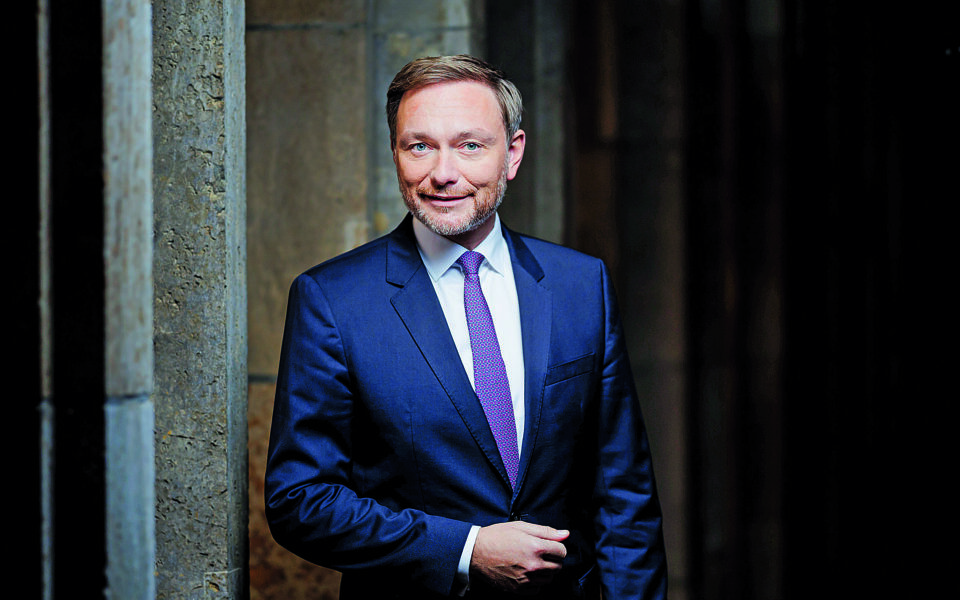‘Greek economy has now become more resilient’
Athens and Berlin must normalize public finances without "abusing" escape clause, German Finance Minister Christian Lindner tells Kathimerini

Both Athens and Berlin must proceed to a “normalization” of their public finances without “abusing” the escape clause, stresses German Federal Minister of Finance Christian Lindner in an exclusive interview with Kathimerini.
He specifies that the approach must not include increases in taxes, but a re-examination of expenses and the return of additional state income resulting from the high rate of inflation. He also discusses the Greek economy, the energy crisis and the Stability Pact.
The Commission recommended the extension of flexibility for the public finances of member-states into 2023. You expressed some reservations. Would you like to specify what this would entail in practice?
The European Commission recommended extending the current escape clause of the Stability and Growth Pact. The current economic data would have permitted a different interpretation; however, the great uncertainty was a deciding factor for the Commission. The important thing now is that the member-states do not make use of this clause unnecessarily. We must all thoroughly examine what expenses are truly necessary and what the priorities must be. The Greek economy has recovered well since the Covid-19 pandemic, better than many other European states.
What about Germany? Will it also restrict its fiscal policy?
I would talk about a normalization rather than a restriction of fiscal policy. After the high additional spending of the last two years, I want to return to a neutral fiscal policy. The state must not help fan inflation. In Germany, the debt brake, which is enshrined constitutionally, obliges us to keep to the provisions on public debt once again. This reinforces the credibility of our institutions and allows for the creation of a fiscal buffers, to shield us against future crises.
Does fiscal discipline mean higher taxes for increased revenue or lower spending for reduced expenses?
German businesses and households are already significantly burdened by the sharply rising prices, especially for energy. This is why it is important for me to return additional income, flowing into government coffers due to the high rate of inflation, to citizens and those businesses that have been particularly hardest hit. When it comes to spending, there has been coordination within the federal government to set priorities with greater consistency and to examine the efficacy of this spending. Tax increases would be counterproductive.
There is a conversation to be had on the eurozone’s long-term fiscal rules. What do you think of the working plan of the European Stability Mechanism for a deficit at 3% of GDP but an upper debt limit of 100% of GDP?
We need national economies that are growing and have fiscal stability. The European fiscal rules are an important precondition to ensure this. During the recent crises, this framework consistently proved that it is flexible. Over the last few months, we have held many conversations at a European level about reviewing this framework. We will need a consistent system to reduce public debt in the future too. Increasing the debt limit would be a move in the wrong direction. Your country, in particular, has bitter experience of high public debt. I do not anticipate such a suggestion from the European Commission either.
What is your view on suggestions including the exemption of defense spending from fiscal calculations?
Defense spending is naturally covered by the European fiscal rules. We should stick to that.
What is your working scenario at the German Ministry of Finance? How do you see inflation developing?
The economic recovery from the pandemic is significantly burdened by the consequences of the Russian war of aggression in Ukraine. Additionally, inflation is at the highest level it has been in the last 40 years. There are estimates that the pressure on prices due to fuel and supply chain issues will gradually ease once again. However, there is also a risk that we will enter into a situation with high inflation and a low growth rate, so-called stagflation. We must counteract this risk. However, it is important for governments to not exert additional pressure on prices. To increase our growth prospects in the midterm what we need now above all are favorable conditions for innovation and the creation of new businesses, less bureaucracy, and the mobilization of private investors.
How do you rate the progress that has been made in the Greek economy? What do you think could be further improved?
The Greek economy recovered very quickly from the downturn caused by the pandemic. The rate of growth in 2021 was among the highest in Europe. This shows that the Greek economy has now become more resilient. The rate of unemployment has been falling for years. With the National Recovery and Resiliency Plan, the Greek government presented a comprehensive program of reforms to reinforce the growth potential of the country. It is receiving significant support from the European Union with funds from the Recovery and Resilience Facility in the process. Greece is one of the countries whose National Recovery and Resiliency Plan is tied to a very ambitious timeframe. This should support further economic development, through, for example, the digitalization of administrative and legal processes.
How confident are you that the Greek debt is sustainable?
The sustainability of public finances is to Greece’s own advantage. The reduction of public debt requires great patience. However, Greece has proven that it is capable of meeting such challenges in the past.
What are the sectors that German businesses can invest more in, mutually benefiting your country and Greece?
Greek and German businesses have been collaborating well for years, something that is to our mutual benefit, and which is facilitated by the European internal market. The decision about which sectors of the Greek economy German companies invest in is, of course, up to the businesses themselves. The transition to renewable sources of energy is a great challenge for many businesses in Europe and affects Greek and German businesses equally.
Certain people think that your country will not be able to meet the goals set by the green transition and the digital transformation without generous public investment in infrastructure and accompanying policies. What is your opinion?
The digital transformation and the ecological restructuring of our economy are the main challenges of our era. In order for citizens and business to be in a position to shape this transition, there must above all else be the right conditions. Of course, targeted public investments are key as is the promotion of private investment.
Would you say Germany made mistakes in its energy security strategy? How are the prospects of the German economy shaped given its reliance on Russian energy reserves?
The unilateral dependence on Russian energy exports was a mistake. We have recognized this and we are now diversifying our sources of energy to be more independent in the future. The development of renewable energy sources has an important role to play here. By diversifying our energy sources, we are reducing pressure on prices. Beyond this, we are working on commercial agreements to overcome issues with our supply chain and to generate economic growth.





